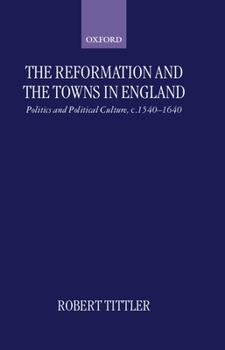The Reformation and the Towns in England: Politics and Political Culture, C. 1540-1640
Select Format
Select Condition 
Book Overview
This is an important new analysis of the secular impact of the Reformation on English towns. It shows how the transfer of property, coupled with new statutory responsibilities and the destruction of a doctrine-based political culture, enabled many towns to extend their holdings and increase their institutional authority.
Format:Hardcover
Language:English
ISBN:0198207182
ISBN13:9780198207184
Release Date:August 1998
Publisher:Clarendon Press
Length:408 Pages
Weight:1.46 lbs.
Dimensions:1.1" x 5.5" x 8.5"
Customer Reviews
0 rating





